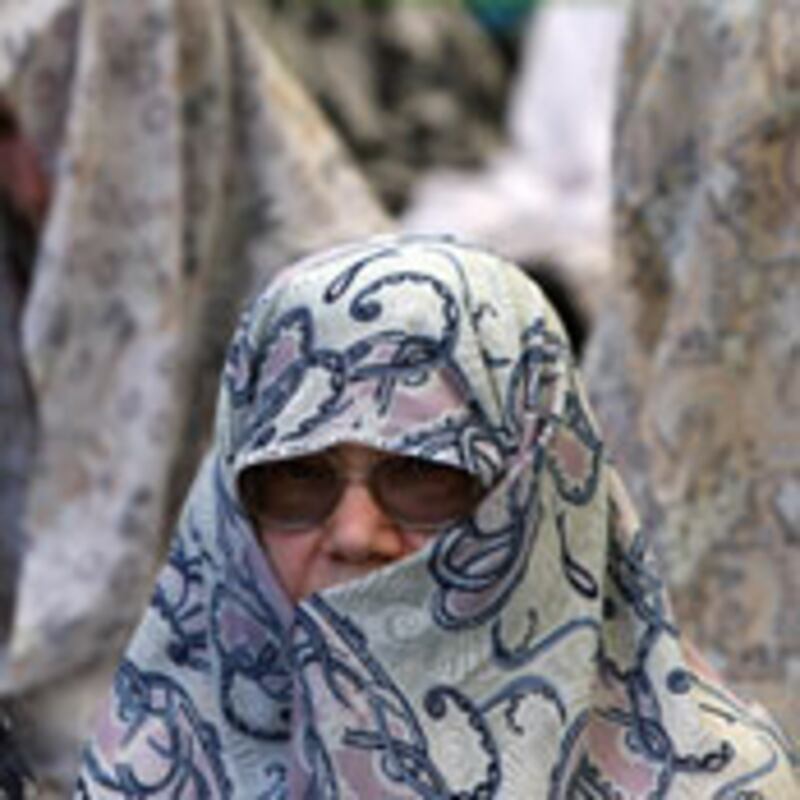
On December 5 in the central Iranian city of Isfahan, known as a center of art and culture, women’s rights campaigner Hayedeh Tabesh was publicly seized by authorities as she was participating in a language class. In May, Tabesh had been banned from traveling outside Iran after she received a letter inviting her to attend an activist training in South Africa. And in October, the authorities served her son with a summons demanding that his mother report to the Intelligence Ministry.
Ebadi’s Nobel medal was confiscated from her safe-deposit box and her bank account was frozen. The government claimed she had failed to pay back taxes, but there was little doubt the state’s intention was political.
Tabesh’s lawyer, Mina Jafari, told the Iranian feminist Web site Signforchange.org that the procedure of the summons likely violated Iranian law, but that her client reported to the ministry anyhow, to “signal her good intentions.”
Tabesh’s play for goodwill didn’t pan out. A few weeks later, she was sent to prison. She wasn’t alone. Last month, Mehrnoosh Etemadi, another Isfahan activist who frequently led workshops on violence against women, was arrested in her home and also jailed. Her computer and personal writings were seized. When Etemadi’s mother asked a state security officer what crime her daughter was charged with, he simply replied, “Her activities in the campaign.”
“The campaign” is the One Million Signatures Campaign, a national effort by Iranian feminists to collect 1 million signatures on a petition demanding an end to discrimination against women. Human-rights organizations working within and outside Iran say the ordeals of the two Isfahan women—who have since been released on a combined $55,000 bail—are part of an intensified crackdown against civil-rights activists in recent weeks, a shift in government policy that is making feminist organizing increasingly difficult.
Since early November, at least 11 feminist leaders have been summoned to court, threatened over the phone, or banned from traveling, according to the One Million Signatures Campaign. Also last month, Iranian state television ran a documentary attacking the nation's women's rights movement, and on December 2, female TV announcers were barred from wearing any makeup on air. On Dec. 6, amid widespread student protests, more than 10 women were arrested at a weekly rally of mothers whose children were killed during protests of the disputed June 12 presidential election.
Perhaps most shocking, in late November the husband of Nobel Peace Prize laureate Shirin Ebadi was detained by authorities, reportedly beaten, and questioned about the whereabouts and activities of the couple’s two adult daughters, who are studying abroad in Europe. Ebadi’s Nobel medal was confiscated from her safe-deposit box and her bank account was frozen. The government claimed she had failed to pay back taxes, but coming on the heels of Ebadi’s support for a United Nations declaration attacking human-rights violations in Iran, there was little doubt the state’s intention was political. ( According to the Norwegian officials who administer the Peace Prize, the medal was returned on Dec. 10.) Ebadi, a women’s rights lawyer, is currently in the United States, and is now fearful of returning to Iran, according to several activists who have spoken to her. (Ebadi is not fluent in English and her staff did not respond to an interview request for this story.)
“I talked to Shirin Ebadi just a few days ago. The authorities have summoned her husband, brother, and sister,” says Omid Memarian, an Iranian journalist who lives in exile in California after being jailed and tortured in Iran for writing reformist newspaper pieces. “Her organization in Iran cannot operate freely. She has been the most significant voice for human rights in Iran over the last five months. Harassing her is a very intimidating signal to others.”
Ebadi is not the only prominent Iranian women’s rights activist now outside the country and hesitant or unable to return. Memarian works with Human Rights Watch to document abuses in Iran, and says at least 17 activists and journalists have fled the country since the election, including three who were raped in detention. Among the exiles are some of the most important Iranian feminist leaders: Shadi Sadr, a 35-year-old lawyer who founded the now-defunct Raahi, a women’s legal aid organization, and also edited Women in Iran, a Web site that reported on sexual violence, capital punishments by stoning, and women’s attempts to access abortion; Parvin Ardalan, a founding member of the One Million Signatures Campaign; and Asieh Amini, a journalist who has documented the stories of female stoning victims.
Mahnaz Afkhami, who served as minister of state for women’s affairs under the pre-revolutionary government of Shah Mohammad Reza Pahlavi, and now runs the Women’s Learning Project in Bethesda, Maryland, says that in recent months, the Iranian government has encouraged civil-rights and pro-democracy leaders to emigrate, as an alterative to lengthy imprisonments or executions that could further inflame a restive public.
“The general policy—and this is reasonably new—is for the government to get rid of the activists instead of keeping them in prison,” Afkhami says. “The idea is to make sure they leave the country. That’s how they become irrelevant actually, relative to the kind of role they can play when they’re inside. When you’re outside you lose contact. You lose the sense of the atmospherics. You lose your capability to grow your constituency.”
The state’s aggressive new stance against the feminist movement was signaled by a documentary that ran on Iran TV2 in November. (All television networks in Iran are controlled by the government.) In the documentary—whose first 13 minutes are available at the Web site TehranNegah.com—a female announcer in a tightly secured headscarf tells viewers that the Iranian feminist movement is funded by foreign powers, including the United Nations and UNESCO. The documentary begins with tape of Iranian women in Western dress attending a 2007 feminist workshop led by Fareeda Shaheed, a prominent Pakistani sociologist who was then visiting Tehran. During the taped meetings, some participants criticize Shirin Ebadi, who is later depicted in the documentary as someone who has enriched herself monetarily through Western support. Later on, there are excerpts from the American animated film Chicken Run, in which farm animals rebel against their owners, escaping slaughter. As the chickens discuss the possibility of escape, an image of the White House flashes on the screen.
The documentary’s ideology is confusing, but the message seems to be that Western-style feminism is a seductive fantasy, but that Iranian gender policies are not as bad as the international community claims. In addition, the video highlights tensions and disagreements among Iranian feminists, seemingly with the goal of delegitimizing the movement’s claim to speak in a united voice on behalf of Iranian women.
There is little doubt, though, that the women’s activists under fire in Iran are confronting a host of serious political issues. The One Million Signatures Campaign has been at work since 2006, as the administration of Mahmoud Ahmadinejad dealt blow after blow to women’s rights, capping the number of women admitted to universities, easing restrictions on polygamy, and spending millions of dollars on public campaigns to enforce sexual chastity and “modesty.” The government has declared membership in the campaign illegal. Iran observers disagree about to what extent the larger Green Movement, which protests the presidential-election results and argues for a more democratic Iran, has embraced the goals of the One Million Signatures Campaign, which has perhaps a more radical platform of overturning the Islamic laws that codify women as second-class citizens. Sanam Anderlini, though, a Washington-based consultant on international women’s issues, says attacks against the women’s movement are a clear attempt to weaken the larger reformist uprising, by picking off a segment of the movement that has years of experience in on-the-ground organizing and resistance.
“The issue of gender equality and women’s leadership seems well integrated into this movement,” Anderlini says. “You see it in the images of the men and women walking in the street together. It’s almost as if the issue of gender equality is becoming a mainstream issue.” Later in our conversation, Anderlini, who is regularly in touch with relatives in Iran, laughs wryly. “The images of men beating women up in the street has just struck people, both internationally and nationally,” she says. “They have a version of gender equality in Iran. They beat women and men up equally in public.”
Dana Goldstein is an associate editor and writer at The Daily Beast. Her work on politics, women’s issues, and education has appeared in The American Prospect, Slate, BusinessWeek, The New Republic, and The Nation.






